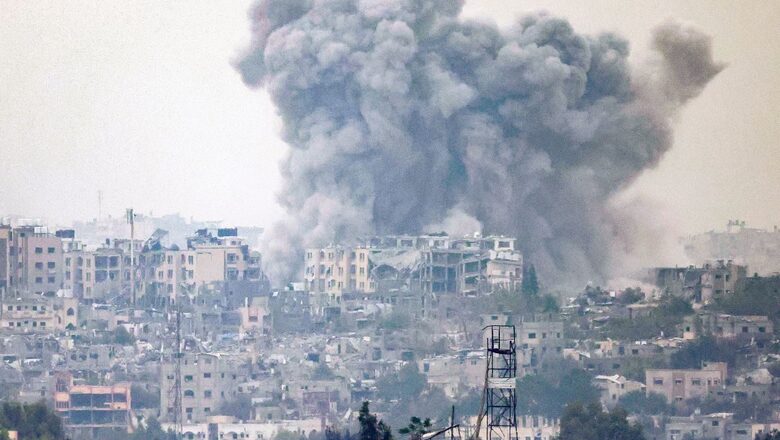
views
The UN General Assembly on Friday voted on a Jordan-sponsored resolution titled ‘Protection of civilians and upholding legal and humanitarian obligations’. The resolution drafted by 22 Arab countries called for an immediate “humanitarian truce” in the Israel-Hamas war and unhindered humanitarian access to the Gaza Strip.
The vote on the resolution was called on the back of a punishing Israeli response to the Hamas terror attack on October 7. On that day, one of the holiest in the Jewish calendar, Hamas terrorists crossed into Israel to butcher hundreds of defenceless Jews. Not content with their depraved handiwork, they also abducted more than 200 of them. They remain untraced. Possibly languishing, if still alive, in abominable conditions where they might be enduring torture in captivity.
In consonance with its right to self-defence, Israel mercilessly gunned for Hamas hideouts in Gaza. The ongoing bombing campaign has flattened the skyline and left many dead, including innocent Palestinian women and children. It aches the heart to witness the trauma they have had to suffer on account of Hamas, which uses Gazans as human shields. Indeed, there are verified media reports of Hamas soldiers forcibly restraining at gunpoint a majority of Gazans looking to leave.
The astounding loss of civilian lives in the ongoing conflict is deeply concerning, and almost everyone agrees as India’s representative in the UN said: “It is necessary for all parties to display the utmost responsibility.”
The onus is, thus, on both Hamas to release hostages and Israel to ensure that its military response doesn’t undermine the diplomatic pursuit of a durable solution. But, much to the shock of certain member states, the UN resolution put up for voting at Jordan’s behest was a one-sided document.
The tone of the document’s righteous impleading appeared to weaponise Palestinian suffering with the intention of indicting Israel. Yes, Israel, the original victim.
Had this not been the case, the resolution would have made a mention of the Hamas attack on Israel. Not just this, it didn’t even refer to the need to safeguard the lives of Jewish hostages under international human rights conventions. It is as if Israeli lives don’t matter.
Concerned by this glaring attempt at drawing a distinction that prioritises a Palestinian life over a Jewish life, Canada chose to move an amendment aimed at incorporating the clause that the UNGA “unequivocally rejects and condemns the terrorist attacks by Hamas that took place in Israel starting on 7 October 2023 and the taking of hostages, demands the safety, well-being and humane treatment of the hostages in compliance with international law, and calls for their immediate and unconditional release”.
But, perplexingly, this proposed amendment was defeated by an open vote. The rejection of the amendment led India to abstain from voting in the UNGA for the Jordan-sponsored resolution.
The decision to abstain is being pilloried by opposition politicians and bleeding hearts. The Narendra Modi-led government is being accused of abandoning the cause of humanity in favour of politics, of allowing Israel to pursue a “senseless war”.
But, it could be argued that the criticism is wholly unjustified.
After all, what law of humanity advocates that compassion must be rationed to advantage only one set of sufferers? How can Israel’s right to self-defence be “senseless”? If it is so, then why is this right sanctioned by international law? Has Israel ever sworn itself to the extermination of every Muslim? Remember, it is the “senseless” Hamas that has incidentally been elected by Palestinians, that has declared it is committed to the eradication of every Jew.
What code of ethics rejects an amendment to the resolution that only sought to uphold the most universal of all truths: that the world is one family. And within it every individual is equal, and every life is equally sacred.
These notions of fraternity also constitute the heart of India’s civilisational credo – ‘Vasudhaiva Kutumbakam’. How then could India back a wholly selective resolution?
As it turns out, New Delhi wasn’t alone. It was part of a bloc of 45 countries, including some of the world’s most advanced democracies like the US, Canada, Germany, Japan and Australia. Even Ukraine, which is losing innocent citizens in the face of an imperious invasion in contravention of human rights conventions, abstained.
Can it be anyone’s case that these countries are in any way less committed to humanism than those 22 Arab countries who drafted the one-sided UNGA resolution? Can anyone credibly argue that Pakistan and Russia are qualified to stand in moral judgment of those who abstained?
Isn’t it also a fact that India and the other countries that abstained have sent planeloads of humanitarian aid to Gaza? Isn’t it also true that virtually all these abstaining countries have backed the “two-state” solution that guarantees Palestinians the right to a homeland?
The truth is that Israel has declared a “humanitarian truce” for 18 years against the votaries of the Palestinian cause in Gaza. Israel unconditionally withdrew from Gaza in 2005. The hope was that Gazans would become the architects of their own destiny. But what did the Gazans do? How did they use the opportunity? The answer was delivered on October 7.


















Comments
0 comment